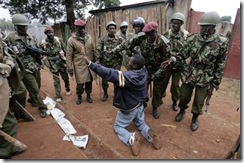
The opposition was boosted Tuesday by the election of their candidate for parliament speaker, but Odinga's supporters promised to continue protesting until President Mwai Kibaki and his government acknowledge that his re-election was flawed.
Though braced for violence, Nairobi was mostly calm Wednesday with no sign of large crowds gathering by midday, though police fired tear gas and live rounds to quickly disperse a hundred young men in the Kibera slum.
Hurled tear gas
In the coastal city of Mombasa, police hurled tear gas and used batons to beat back several groups of protesters several-hundred strong on the outskirts of the city. In the western town of Kisumu, about 1,000 rowdy young men were on the streets carrying a coffin with Kibaki's name on it. Protesters there threw rocks at security forces and one bloodied demonstrator was wounded, though it was not clear how.
The western city of Eldoret was also quiet, though protesters there erected several makeshift roadblocks on the outskirts of town. On one, a dead dog was draped over a pile of rocks with a sign that said "Kibaki Death."
"We are going to keep up the pressure from every legal angle and through all peaceful means until the government agrees to acknowledge that the election results were false and that a solution must found to the political crisis," Odinga spokesman Salim Lone told The Associated Press.
"The rallies will show the government that the people of Kenya will not allow the theft of the election to stand."
Foreign and local election observers have said the vote count in the Dec. 27 presidential election was deeply flawed. And although the electoral chief pronounced Kibaki the victor, he later said he had been pressured to release the results and did not know who won.
Kenya's image marred
The postelection violence, in which more than 600 people have been killed and a quarter of a million displaced, has marred Kenya's image as a stable democratic oasis in a war-ravaged region and damaged its tourist-dependent economy. It has also aggravated long-simmering ethnic tensions and tribal conflicts over land ownership.
On Tuesday, lawmakers chose Kenneth Marende, a 52-year-old lawyer and opposition supporter, to be the new speaker of the National Assembly in a narrow 105-101 vote over a Kibaki loyalist.
The election marked the first parliament session since the controversial Dec. 27 vote. It also brought Kibaki and Odinga into the same room for the first time since then, but the two rivals studiously ignored each other.
Marende's victory buoyed the opposition. While the speaker cannot directly block Kibaki's legislative agenda, he can slow it with his rulings and allow motions against the president's policies to be debated.
Click for related content
Kenyan neighbors, divided by tribe
Former U.N. Secretary-General Kofi Annan had been expected in the capital Tuesday night on a mediation mission, but the visit was postponed for several days after he fell ill with flu, his Geneva office said.
In an interview published Wednesday in the Kenyan Daily Nation newspaper, U.S. Ambassador Michael Ranneberger said it was not possible to say who won last month's vote because it was "not transparent." According to official results, Kibaki beat Odinga by 230,000 votes out of around 10 million ballots cast.
"But our analysis that the vote was extremely close highlights the need for political accommodation between two sides," Ranneberger said.
NAIROBI, Kenya - Police fired tear gas to disperse protesters in several Kenyan cities Wednesday at the start of three days of opposition rallies that threatened to plunge the nation's streets back into postelection violence.
Opposition leader Raila Odinga, whose supporters believe he was robbed of the presidency through vote rigging in last month's election, called the rallies in 42 locations nationwide, despite a government ban.
Similar rallies earlier this month degenerated into violence in the capital and other cities, with security forces beating back mobs of angry youths with water cannons, tear gas and live bullets, as homes in the capital's slums burned.
